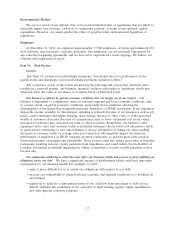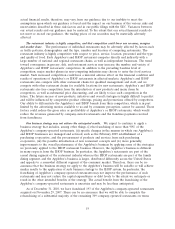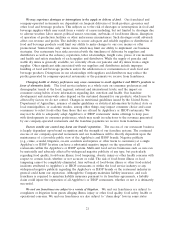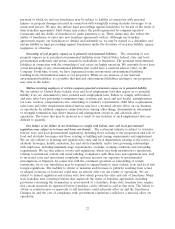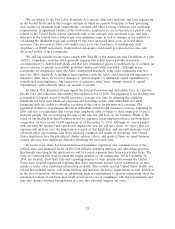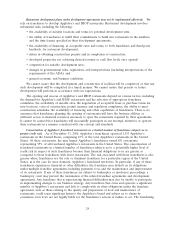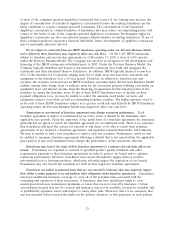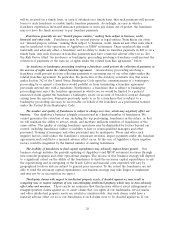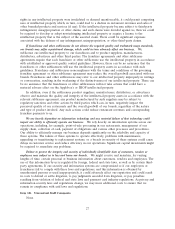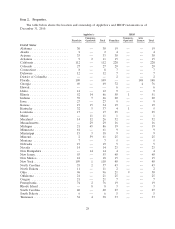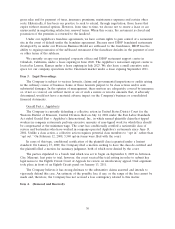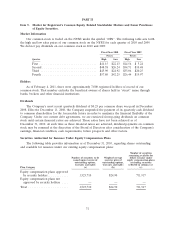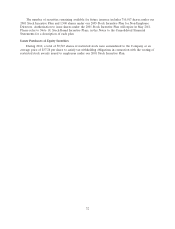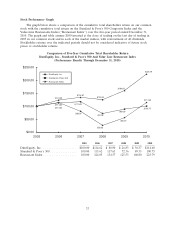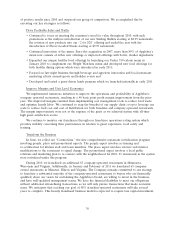IHOP 2010 Annual Report Download - page 43
Download and view the complete annual report
Please find page 43 of the 2010 IHOP annual report below. You can navigate through the pages in the report by either clicking on the pages listed below, or by using the keyword search tool below to find specific information within the annual report.rights in any intellectual property were invalidated or deemed unenforceable, it could permit competing
uses of intellectual property which, in turn, could lead to a decline in restaurant revenues and sales of
other branded products and services (if any). If the intellectual property became subject to third-party
infringement, misappropriation or other claims, and such claims were decided against us, then we could
be required to develop or adopt non-infringing intellectual property or acquire a license to the
intellectual property that is the subject of the asserted claim. There could be significant expenses
associated with the defense of any infringement, misappropriation, or other third-party claims.
If franchisees and other sublicensees do not observe the required quality and trademark usage standards,
our brands may suffer reputational damage, which could in turn adversely affect our business. We
sublicense our intellectual property to our franchisees and to product suppliers, manufacturers,
distributors, advertisers and other third parties. The franchise agreements and other sublicense
agreements require that each franchisee or other sublicensee use the intellectual property in accordance
with established or approved quality control guidelines. However, there can be no assurance that the
franchisees or other sublicensees will use the intellectual property assets in accordance with such
guidelines. Franchisee and sublicensee noncompliance with the terms and conditions of the governing
franchise agreement or other sublicense agreement may reduce the overall goodwill associated with our
brands. Franchisees and other sublicensees may refer to our intellectual property improperly in writings
or conversation, resulting in the weakening of the distinctiveness of our intellectual property. There can
be no assurance that the franchisees or other sublicensees will not take actions that could have a
material adverse effect on the Applebee’s or IHOP intellectual property.
In addition, even if the sublicensee product suppliers, manufacturers, distributors, or advertisers
observe and maintain the quality and integrity of the intellectual property assets in accordance with the
relevant sublicense agreement, any product manufactured by such suppliers may be subject to
regulatory sanctions and other actions by third parties which can, in turn, negatively impact the
perceived quality of our restaurants and the overall goodwill of our brands, regardless of the nature
and type of product involved. Any such actions could reduce restaurant revenues and corresponding
franchise payments to us.
We are heavily dependent on information technology and any material failure of that technology could
impair our ability to efficiently operate our business. We rely heavily on information systems across our
operations, including, for example, point-of-sale processing in our restaurants, management of our
supply chain, collection of cash, payment of obligations and various other processes and procedures.
Our ability to efficiently manage our business depends significantly on the reliability and capacity of
these systems. The failure of these systems to operate effectively, problems with maintenance,
upgrading or transitioning to replacement systems, or a breach in security of these systems could cause
delays in customer service and reduce efficiency in our operations. Significant capital investments might
be required to remediate any problems.
Failure to protect the integrity and security of individually identifiable data of customers, vendors or
employees may subject us to loss and harm our brands. We might receive and maintain, for varying
lengths of time, certain personal or business information about customers, vendors and employees. The
use of this information by us is regulated by foreign, federal and state laws, as well as by certain third-
party agreements. If our security and information systems are compromised or if our employees or
franchisees fail to comply with these laws and regulations, and this information is obtained by
unauthorized persons or used inappropriately, it could adversely affect our reputation and could result
in costs to defend or settle litigation, to pay judgments awarded from litigation, or pay penalties
resulting from violation of federal and state laws and payment card industry regulations. As privacy and
information security laws and regulations change, we may incur additional costs to ensure that we
remain in compliance with said laws and regulations.
Item 1B. Unresolved Staff Comments.
None.
27


